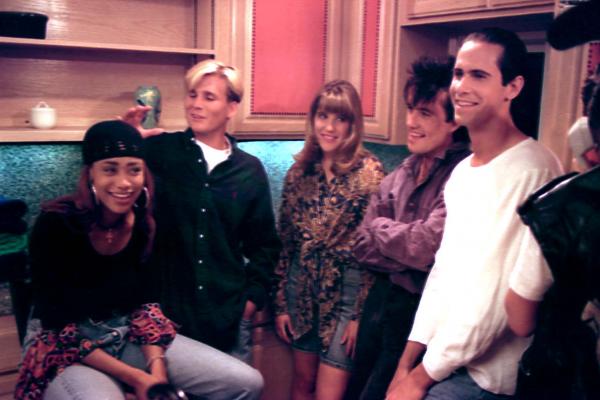This is the true story... of seven strangers... picked to live in a house...work together and have their lives taped... to find out what happens... when people stop being polite... and start getting real... The Real World.
The Real World was – and continues to be – a popular television show, and its influence is far greater than its core MTV viewing audience. Through its collection of diverse personalities and with a willingness to address controversial social issues, when The Real World first aired in May of 1992 it started what many would describe as our modern-day reality TV phenomenon. Not only did The Real World spark a new entertainment genre, but its impact was far greater, for it helped blur the lines between authentic and artificial. In other words, one can argue that The Real World sparked an ongoing transformation of what we perceive as real in our world.
As is the case with other reality TV shows, The Real World has received numerous allegations of being simulated and/or staged. Due to such accusations, some viewers are not convinced that The Real World is fully real. Some accuse MTV of shoddy and selective editorial choices that take events out of context, and as a result, give false impressions of what actually occurred in real time. And of course, some perceive the very concept of The Real World as a grand misnomer, for in the real world people do not live like those in The Real World, as few in our world can claim to live in cost-free luxurious dwellings in awesome cities under the watchful eye of camera crews who broadcast their daily actions for millions of viewers to see and scrutinize. For many, The Real World does not seem real at all.
While the various criticisms of The Real World (and other so-called “reality-based” shows) are indeed valid, what is striking is that such questions surrounding what is “real” can also be directed at our own perceptions of reality.
Similarly, we in the general public often receive an edited intake of information based upon a wide variety of personal choices, public influences, and political agendas. But we often fail to recognize the various influences that we allow to shape our perceptions, and in doing so, we too often assume that our views of reality are universal and/or superior. As a result, when we view our personal perceptions as common sense or unanimous, we tend to judge alternatives not merely as different, but simply wrong. And so, one of the keys attributes toward the pursuit of common good in our real world is recognizing the countless public influences that shape our personal views of reality.
As each person is molded every day by (among other things) public influences and political agendas, some important questions to consider are: “Who are my closest friends and colleagues; how do I spend the majority of my time and money; where do I receive my information and entertainment; and what are the values and priorities that my elected leaders try to promote through their policy implementation and proposals?”
While there are many more questions to consider, within such inquires we find the keys to unlocking a more faithful awareness of the influences that shape our deep-seeded views of God’s real world.
In response to the above questions, one of the striking characteristics of our modern existence is that while technology allows for countless local, national, and international connections, far too many people seem to be increasingly isolated from alternative points of view. Instead of exploring the mass diversity of beliefs and opinions that fill our human community, an alarming amount of citizens would rather use the technological tools at our disposal to close in upon a narrow view and grip on to that which is most common or comfortable. And so, perhaps the time is upon us to open our hearts and minds to the possibility that what we perceive as real in our world may not be the full story, but that which we often experience each day is more like watching The Real World, for our personal observations are often more like an edited view of God’s larger and more complex narrative. As a result, instead of trying to sink deeper into a limited and incomplete concept of reality, we should find joy and excitement in looking beyond our comfortable information sources, and instead seek alternative views, new understanding, and as a result, fresh and multifaceted concepts of diverse realities in our world. Instead of labeling that which is different as wrong, we will find that which is different is often an important piece of God’s global narrative.
In order to search for the real world in which God intends for us, the key may be to begin with an embrace of alternative perceptions, and by doing so, allow God to work within the interaction of ideas, shape new perceptions, and thus create new and faithful realities. In searching for such a real world, we can embrace unity instead of uniformity, grow more aware of the influences that shape us, and learn to understand those whose perceptions may be different from our own. The results of such a search can help us to embrace the full story of what God has done, is doing to, and will continue to do through our lives, and thus produce a real world in which real reconciliation and real transformation is our remarkable reality.
Brian E. Konkol is an ordained pastor of the Evangelical Lutheran Church in America (ELCA), serves as Co-Pastor of Lake Edge Lutheran Church (Madison, WI), and is a PhD candidate in Theology & Development with the University of KwaZulu-Natal (South Africa.).
Got something to say about what you're reading? We value your feedback!
